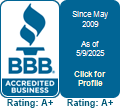
We spend a good majority of our time indoors. In fact, the Environmental Protection Agency (EPA) has estimated being inside makes up 90% of our schedule. Although, the EPA also says your indoor air can be three to five times worse than outside your home.
That’s since our houses are firmly sealed to enhance energy efficiency. While this is fantastic for your energy costs, it’s not so good if you’re amid the 40% of the population with respiratory allergies.
When outdoor ventilation is insufficient, pollutants like dust and volatile organic compounds (VOCs) may get captured. Consequently, these pollutants might irritate your allergies.
You can improve your indoor air quality with clean air and regular housework and vacuuming. But if you’re still having problems with symptoms while you’re at home, an air purifier may be able to help.
While it can’t get rid of pollutants that have gotten trapped in your furnishings or carpet, it might help purify the air circulating around your residence.
And air purification has also been scientifically verified to help reduce some allergic symptoms, according to the American College of Allergy, Asthma and Immunology. It can also be useful if you or a family member has lung issues, such as emphysema or COPD.
There are two kinds, a portable air purifier or a whole-home air purifier. We’ll go over the distinctions so you can learn what’s correct for your house.
Whole-House Air Purifier vs. Portable Air Purifiers
A portable air purifier is for a single room. A whole-house air purifier works alongside your heating and cooling equipment to purify your entire house. Some types can work on their own when your heating and cooling equipment isn’t on.
What’s the Best Air Purifier for Allergies?
Seek an option with a High Efficiency Particulate Air (HEPA) filter. HEPA filters are used in hospitals and provide the best filtration you can find, as they eliminate 99.97% of particles in the air.
HEPA filters are even more useful when used with an ultraviolet (UV) germicidal light. This dynamic blend can eliminate dust, dander, pollen and mold, all of which are standard allergens. For the best in air purification, consider equipment that also has a carbon-based filter to eliminate household smells.
Avoid using an air purifier that generates ozone, which is the top ingredient in smog. The EPA warns ozone could worsen respiratory issues, even when discharged at low concentrations.
The Allergy and Asthma Foundation of America has made a list of questions to ask when buying an air purifier.
- What can this purifier remove from the air? What doesn’t it remove?
- What’s its clean air delivery rate? (A better amount means air will be purified faster.)
- How frequently does the filter or UV bulb need to be replaced]? Can I complete that on my own?
- How much do replacement filters or bulbs cost?
How to Decrease Seasonal Allergy Symptoms
Want to get the {top|most excellent|best] outcome from your new air purification system? The Mayo Clinic suggests doing other procedures to limit your exposure to problems that can cause seasonal allergies.
- Stay inside and keep windows and doors closed when pollen counts are elevated.
- Have other family members trim the lawn or pull weeds, since these jobs can aggravate symptoms. If you are required to do these jobs yourself, you may want to consider trying a pollen mask. You should also bathe without delay and put on clean clothes once you’re completed.
- Avoid drying laundry outside your home.
- Use your air conditioner while at home or while driving. Consider adding a high efficiency air filter in your residence’s home comfort unit.
- Equalize your house’s humidity percentage with a whole-house dehumidifier.
- Hardwood, tile or linoleum are the suggested flooring materials for reducing indoor allergens. If your home has carpet, install a HEPA filter on your vacuum cleaner.
Let Our Pros Take Care of Your Indoor Air Quality Requirements
Ready to move forward with adding a whole-house air purifier? Give our specialists a call at 801-305-4777 or contact us online to get an appointment. We’ll help you find the ideal unit for your family and budget.

